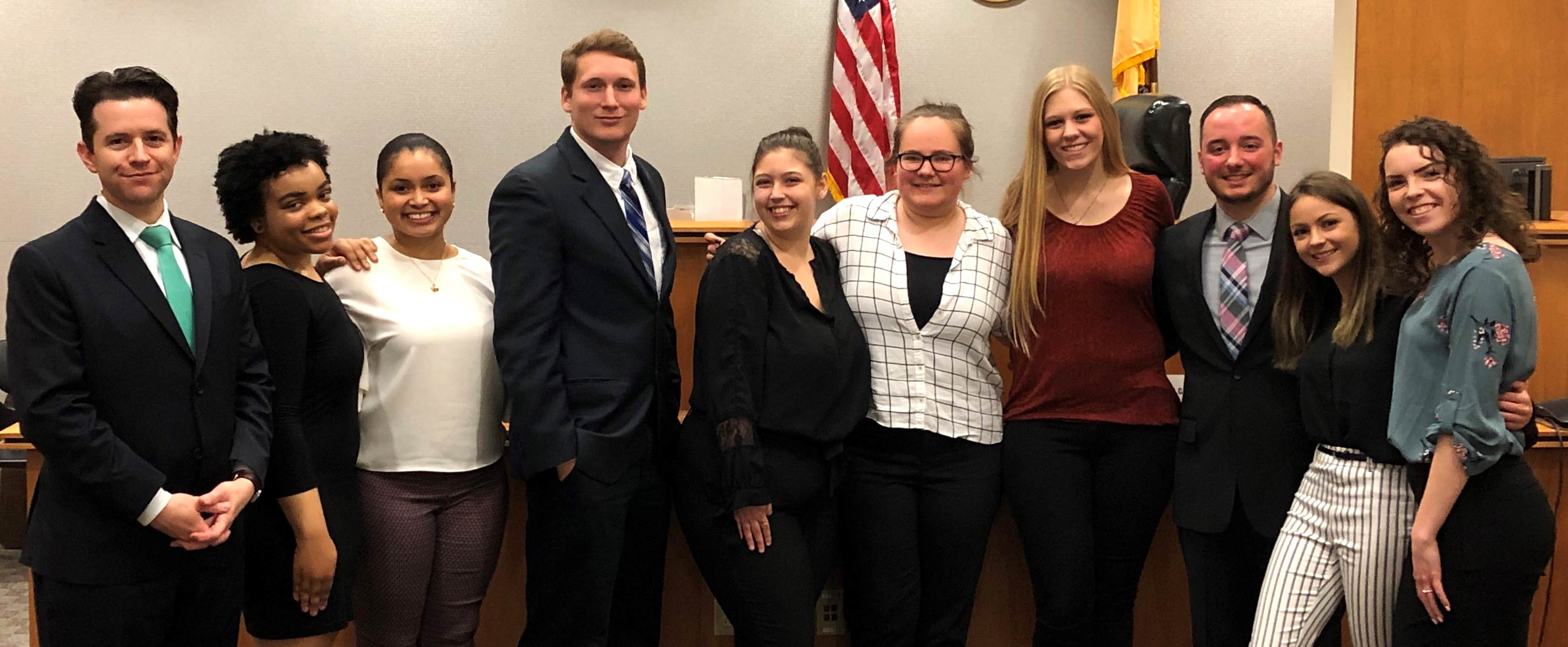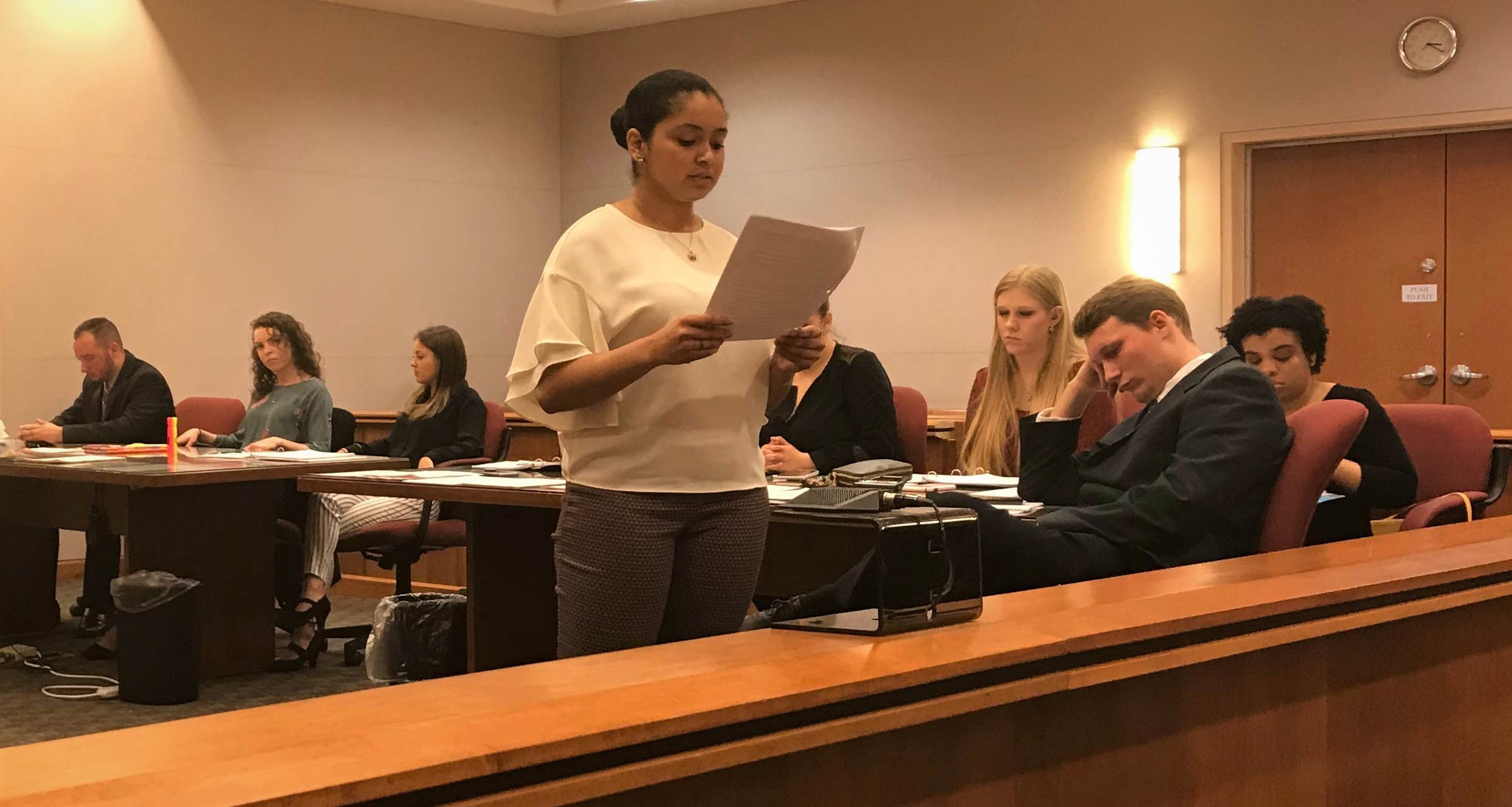Spotlight On: Course Gives Students Real-Life Courtroom Experience

From left, Rick McKelvey, adjunct instructor of Criminal Justice at Stockton University, with students Camara Wimbush, Yomaris Acosta, Matthew Epstein, Alexis Motika, Paige Jardin, Elizabeth Hartka-Winkelspecht, Daniel Rossi, Michele Monteserin and Christina Michael.
Galloway, N.J. – Guilty? Not Guilty? Stockton University students got to learn just what goes into the process of coming to those verdicts this spring in Trial Advocacy, a course taught by Rick McKelvey, adjunct instructor of Criminal Justice, who also happens to be an assistant prosecutor at the Atlantic County Prosecutor's Office.
The course offered students an opportunity to learn about the process of planning, organizing and putting on a criminal jury trial. Many also took advantage of the opportunity to observe McKelvey’s own criminal murder trials which were held in January and April at the Mays Landing Courthouse, offering them a real-life window into what happens in the courtroom.
“Trial Advocacy is one of my favorite courses I've taken at Stockton so far. Reading about how the parts of a trial work and then doing exercises to get the feeling of what it's like to prepare for an actual trial really helped me become more familiar and comfortable with the whole trial process,” said Paige Jardine ’21, a Criminal Justice major and Political Science minor, who aspires to be a criminal lawyer. “On top of that, having the opportunity to go and see a real criminal trial was such a cool experience. It really helped me put all the pieces together and apply what I learned in class to something in real life, something that'll I'll be doing in my future.”
The students’ final project culminated on April 30, where they put on their own criminal trial, “State v. Rausch,” to a jury of their peers and family in a real courtroom in the Mays Landing Criminal Courthouse (made possible by the permission of the Presiding Criminal Judge Bernard DeLury.) Each student acted as both an attorney and a witness, making and responding to legal objections to the judge, who was McKelvey. They were evaluated based upon their performance and their trial manuals, which they learned throughout the semester is an important part of preparation and organization needed to put on a trial.
 Recent graduate Yomaris Acosta ’19, who received a Criminal Justice degree with a minor in Political Science, said
Trial Advocacy and the experience it provided further solidified her decision to attend
law school.
Recent graduate Yomaris Acosta ’19, who received a Criminal Justice degree with a minor in Political Science, said
Trial Advocacy and the experience it provided further solidified her decision to attend
law school.
“It made me very excited about what my future can look like as an attorney in the courtroom. It was great practice,” said Acosta, who is preparing for the LSATs and will apply to law schools this fall.
“This course is for any student interested in a career in law or criminal justice, or who – like many lawyers – just likes performing or arguing. In class, we focus those interests into convincing a jury that a defendant is, or is not, guilty of a crime beyond a reasonable doubt. Our students this semester came from diverse backgrounds and experience levels,” McKelvey said. “We spent a good portion of time separating fact from fiction by discussing Law and Order-type shows, true crime documentaries, and then comparing them with YouTube clips from real trials and what we learned about the law in our textbook. They worked very hard to put together an excellent trial in an actual courtroom based on what they learned.”
Reported by Mandee McCullough


